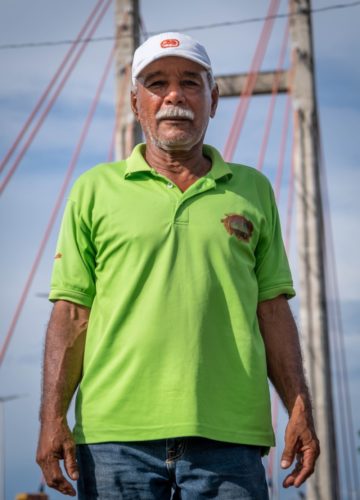Taiwan is losing bridges in Central America
The "Taiwan Friendship Bridge" in Costa Rica was originally a gift from the Taiwanese government. There is now a motion to officially remove "Taiwan" from the name. It's a sign of the times: Taiwan's influence in Central America has waned amid Beijing's growing interest in the region.

GUANACASTE, COSTA RICA — Spanning the sluggish Tempisque River in the western reaches of Costa Rica, a bridge connects the isolated Nicoya peninsula with the mainland in one of the country’s poorer regions. Almost 800 meters in length, signs fixed to the banks sternly warn against swimming in the coffee-colored current, due to an abundance of crocodiles. Nearby, a granite slab inscribed in three languages — Spanish, English, and traditional Chinese — designates the structure’s name: “Taiwan Friendship Bridge.” Ask a local, though, and you might instead hear its colloquial moniker, delivered with a sheepish smile: “Puente de la Puñalada.” Backstab Bridge.
Inaugurated in 2003, the $27 million bridge was paid for by Taiwan, widely considered a gift for continued relations. It was rechristened in the minds of Ticos (the affectionate, self-bestowed slang for Costa Ricans) just four years later, however, when Costa Rica shifted formal diplomatic recognition from Taipei to Beijing. Within a year, ground had broken for the $110 million National Football Stadium in downtown San José — completely built and fully funded, of course, by the People’s Republic of China.
The switch seems, at least on the surface, at ideological odds with Costa Rican society. The isthmus nation prides itself on its strong democratic ideals, ranking 8th on the planet for World Press Freedom and tying Austria for strength of democracy. However, like much of the world, the economic incentives of aligning with Beijing have proven too enticing to ignore.
Aside from the new stadium, China almost immediately delivered an additional $130 million in aid, purchased $300 million in Costa Rican bonds, and established a scholarship program in the country. By 2011, a Free Trade agreement was signed, and China rose to become Costa Rica’s second-largest trading partner. In 2018, Costa Rica became a signatory of the Belt and Road Initiative, and new infrastructural projects are underway, not the least of which being the expansion of the San José-Limón highway, financed with a nearly half-billion-dollar Chinese loan.
Costa Rica’s break with Taiwan was a significant blow for the island. Before the switch in 2007, it was one of just 25 nations maintaining diplomatic relations, 12 of which were in Central America and the Caribbean. Among these countries, Costa Rica was one of the wealthiest and most influential, a key asset in their fight for global recognition.
Taiwanese academics stressed at the time that this might result in a “domino effect” of nearby countries switching allegiance. Chinese-state media agreed, describing Costa Rica as “playing a pivotal role as a platform for China’s economic and diplomatic expansion into the region.”
Both Taiwanese academics and Chinese strategists have proven to be correct. In the 15 years since, Taiwan’s Central American bulwark has begun to crack. Neighboring countries Panama, Dominican Republic, El Salvador, and Nicaragua have all since switched recognition to mainland China, the most recent in just 2021. Today, the number of countries that extend formal diplomatic recognition to Taiwan has dwindled to just 14, half of which are in Central America and the Caribbean.
Burning bridges
Not a hundred meters from the rusted twin poles that once flew Taiwanese and Costa Rican flags, Jorge Castillo is slinging granizados, a cloyingly sweet mixture of syrup, caramel, condensed milk, and shaved ice. His lime green shirt matches the other salesmen milling around, emblazoned with a logo proclaiming “Vendors Association of the Taiwan Friendship Bridge.” He has been hawking his icy treats here for 20 years, since the bridge was opened, and witnessed firsthand the impact it has had on his home.
“People felt very good [toward Taiwan],” he said. “When the bridge was opened, on one hand, it completely benefited tourism. One hundred percent there was benefit [for the peninsula], but not for workers like us. When the ferry was there, we worked there, we had businesses there.”
While infrastructural gifts are a regular diplomatic strategy for both Taiwan and mainland China, the questionable long-term benefits for the locals are a common criticism. The companies contracted for construction hail from the donor country, which also typically imports a labor force. By Castillo’s estimation, only 10% of the workers on the bridge were Costa Rican.
Castillo taps his fingers on his steel cart for emphasis. “So it benefited tourism, but harmed the worker. Thank god more people have come [because of the bridge], so we have the option to work here now.”
Now, a bill working its way through the Costa Rican legislative system threatens to help erase the relationship that once existed. File 22370, originally proposed in January 2021, pushes to change the name of the bridge to “The Friendship Bridge: Emanuel Ajoy Chan.” Notably, the bill doesn’t acknowledge “Taiwan” as part of the current name, referring to the bridge’s “current” name as “The Friendship Bridge,” as opposed to “Taiwan Friendship Bridge.”
The proposal states that it seeks to honor Emanuel Ajoy Chan, who previously served as a deputy for Guanacaste Province and was instrumental in striking the bridge deal with Taiwan. He passed away on December 10, 2020.
To fully understand the peculiarity of this proposal, one must understand the cultural importance of Tico landmarks. There is no address system in Costa Rica in a traditional sense: buildings have no numbers, and roads often have no names. A typical address might be “100 m south of St. Mary’s church,” or “300 m west of the Coca-Cola plant.” To not know the landmarks in your area is to quite literally not know where you are.
As such, the naming of Tico landmarks requires consultation with the National Commission of Nomenclature, a governing body that assesses proposals based on a series of pre-established requirements.
Requirements that File 22370 falls well short of.
The commission noted that to name something eponymously, a person needs to have been deceased for at least five years. File 22370 was submitted 35 days after Chan’s passing. Furthermore, changing the name of an existing landmark is only justified if the current name is “in duplicate or inappropriate”; the Taiwan Friendship Bridge checks neither box.
“Twenty years later we cannot come and change its name,,” said Ivannia Rodríguez, president of the Nomenclature Commission. “We cannot look at the weathervanes and just say another name is coming. The [current] name has not suffered any demerit, and it is well-placed.”

But back in Guanacaste, Jorge Castillo is fine with the name change. “The belief is that [Taiwan] just gave it away,” he said. “But it was not so much like that. We gave them permits for harvesting fish and shrimp… The stadium was the same — it was more like a transaction.”
“Although, I’m going to need a new shirt,” he laughed, tugging at a Taiwanese logo on his fluorescent polo.
Ultimately, the motion passed a preliminary vote, 5-2, in the Congressional Legal Commission. In a livestream of the proceedings, Representative Rocío Alfaro was the only elected official present that seemed to make any effort to address the island-sized elephant in the room. “There is no need to create a controversy of this nature by approving something that we know in advance would not be right,” she said, explaining her vote against the bill.
In the course of the 41-minute broadcast, the word “Taiwan” was not uttered a single time.
Taiwan’s future in Central America
A five-minute walk from the legislative halls where the motion was passed, a weathered sign hangs from the second story of a nondescript building. Bad Bunny sometimes emanates through the floor from a street-level restaurant serving two-for-one margaritas. Here is the office of David Chiang, who is from Taiwan but has lived in Costa Rica for 25 years; more recently, he has been serving as president of the Taiwanese Association of Costa Rica.
“We believe that it would be a political intervention if they manage to change the name of the bridge,” he responded over email. “And we suppose that after all that, they are going to ask for a donation to repair the bridge.”
Based on the structure’s deteriorating condition since a 2012 earthquake, and China’s track record in the region, his hypothesis has merit. The National Stadium, after all, is just a few blocks away.
“For us, Beijing is very welcome here,” he said. “The problem is that while they participate, we” — referring to the Taiwanese — “get kicked out.”
For Taiwanese passport holders in Costa Rica and around the world, these geopolitical chess games have real-world consequences. Chiang estimates that membership in his association has declined 60% since 2010, as families have decided to return to Taiwan.
“Since currently we do not have a Taiwan office in Costa Rica, Nicaragua, El Salvador, or Panama, it makes it very difficult for us to legalize documents or change our passports,” he said. The nearest Taiwanese embassy is in Honduras. “When we need help from our government, we have no one to ask.”
In the wake of Nicaragua’s severing of relations last year, Honduras, Guatemala, and Belize renewed their commitment to the island. Meanwhile, in Costa Rica, the motion for rebranding the Taiwan Friendship Bridge moves for discussion by a plenary meeting that remains unscheduled as of now.
Until then, the stone monument remains, proclaiming the “fraternal ties” of Costa Rica and Taiwan. In a symbol for these times — one that is perhaps a bit too on-the-nose — cracks spider-web across the stone surface and directly through the word “friendship” in Chinese.
None of the seven members of the Congressional Legal Commission that voted on File 22370 responded to requests for comment.







